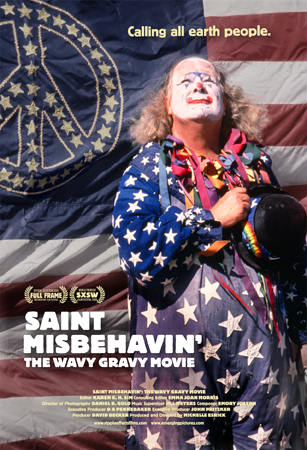'Saint Misbehavin': The Wavy Gravy Movie
 Full Frame Day 2: There’s a man going round with a red nose making people smile; documentary festivals can be very serious affairs - from 10.30 in the morning it’s usually the case that we’re plunged into questions of genocide, disease, loss and sorrow. So it was more than a relief when I found Wavy Gravy in the room today.
Full Frame Day 2: There’s a man going round with a red nose making people smile; documentary festivals can be very serious affairs - from 10.30 in the morning it’s usually the case that we’re plunged into questions of genocide, disease, loss and sorrow. So it was more than a relief when I found Wavy Gravy in the room today.
I missed the sixties by 5 years, and am never sure if the mythology around the decade is the pharmacological residue of the various substances ingested by its protagonists, or the over-statement of a movement that failed by misty-eyed retired peace warriors.
They didn’t stop the war; they didn’t permeate the culture in any positive lasting way; they didn’t change anything, did they?
Hold on, I’m getting a little bit too ‘film critic burned out on not realising that being here is a privilege’. Forgive me. Please. That’s what Wavy would do.
A better question: What’s the problem with fun? What’s the problem with trying to bring more love into the world? What’s the problem with making people happy just by being in the same room?
‘Saint Misbehavin’, the film about the former Hugh Romney is dedicated to revealing that this clown is warm on the inside, I think; burdened for his poor and suffering brothers and sisters, and alive to the possibility that smiling can make almost anything better.
‘Saint Misbehavin’ is about people who were prepared to live beyond the narrow circle of self. Living in community, sharing possessions, helping people look up from the difficulties of the everyday and enjoy it while it lasts, with a detour along the way to help save the eyesight of 2 million people (and counting) in the developing world. The film challenges the notion that the sixties were mostly about self-indulgence. Of course they were nothing but indulgence for some; but we may together suspect they have their reward.
A great Scottish architect once told me that the purpose of architecture is ‘to help human beings live better’. I don’t know if I’m what passes for a serious film critic or not; and I’m not even sure that I want to be. Not that there’s anything wrong with that. So I’m not certain if what I’m about to say is an academically rigorous theory of film, but watching this movie left me thinking that at least part of the purpose of cinema might be the same as designing buildings: to create a space in which people can find more of their better selves; to become the best of what is already within them. ‘Saint Misbehavin’ isn’t necessarily the most aesthetically accomplished documentary I’ve ever seen, but when you’ve got this much humanity on screen it does everything I needed it to do. (Have no fear, dear listeners, I haven’t lost it - that phrase can apply equally to ‘The Exorcist’, ‘Fanny and Alexander’, ‘Solaris’, ‘Magnolia’, and any number of other accepted parts of the canon. I just happen to have had an uplifting experience with a delightful documentary today, that turned out to be far more substantial than ‘delightful’ implies.)
‘Saint Misbehavin’ becomes more than one man’s life story; it’s indicative of what living communally can be, and how human security depends on generosity, not fear. It’s a modest work of art that wants to gently irritate accepted norms of human behaviour and respectability. It loves all people. It offers what its protagonist has dedicated his life to. It wants to suggest that it is possible to harness the energy that all human beings have toward peace.